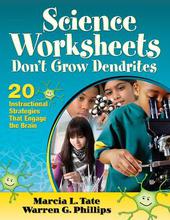
|
Science Worksheets Don't Grow Dendrites: 20 Instructional Strategies That Engage the Brain
Paperback / softback
Main Details
| Title |
Science Worksheets Don't Grow Dendrites: 20 Instructional Strategies That Engage the Brain
|
| Authors and Contributors |
By (author) Marcia L. Tate
|
|
By (author) Warren G. Phillips
|
| Physical Properties |
| Format:Paperback / softback | | Pages:192 | | Dimensions(mm): Height 279,Width 216 |
|
| ISBN/Barcode |
9781620878811
|
| Classifications | Dewey:612.8233 |
|---|
| Audience | |
|---|
|
Publishing Details |
| Publisher |
Skyhorse Publishing
|
| Imprint |
Skyhorse Publishing
|
| Publication Date |
15 August 2013 |
| Publication Country |
United States
|
Description
Bestselling author and renowned educator Marcia L. Tate brings her trademark practicality to teachers seeking the latest brain-compatible tools for engaging students and bringing science to life in the classroom. Coauthored with award-winning science teacher Warren G. Phillips, this must-have resource includes twenty proven brain-compatible strategies and 250 activities for applying them. Teachers will find concrete ways to integrate national science content standards into their curriculum with visual, auditory, kinesthetic, and tactile experiences that maximize retention, including: * Music, rhythm, rhyme, and rap * Storytelling and humor * Graphic organizers, semantic maps, and word webs * Manipulatives, experiments, labs, and models * Internet and spreadsheet projects This book covers a full range of K-12 science subjects, including physical, life, earth, and space science, and provides brain-compatible sample lesson plans. Each chapter offers real-life examples; a what, why, and how for each strategy; activities; and note pages for brainstorming how to implement these exciting new ideas.
ReviewsTateand Phillips provide research-based strategies that will shape your students learning. From music to graphics to technology, they show educators how toincorporate methods that will excite students and make science memorable. --Emily Nedderson Tate and Phillips provide research-based strategies that will shape your students' learning. From music to graphics to technology, they show educators how to incorporate methods that will excite students and make science memorable. --Emily Nedderson
|